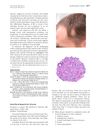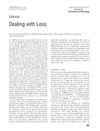 38 citations,
January 2009 in “Journal of Cutaneous Medicine and Surgery”
38 citations,
January 2009 in “Journal of Cutaneous Medicine and Surgery” A woman developed hair loss after starting a treatment with adalimumab, suggesting this medication might cause hair loss.
29 citations,
February 2011 in “PloS one” Astressin-B can reverse and prevent hair loss in stressed mice.
 July 2005 in “British Journal of Dermatology”
July 2005 in “British Journal of Dermatology” New gene mutations linked to skin conditions were found, bacteria and chemicals may worsen acne, a dog mutation could exist in humans, virus-like elements might be involved in psoriasis, and a vitamin D3 treatment doesn't prevent chemotherapy-related hair loss.
[object Object]  July 2023 in “The Egyptian Journal of Hospital Medicine ”
July 2023 in “The Egyptian Journal of Hospital Medicine ” Alopecia areata is a hair loss condition caused by immune factors and can be treated with JAK inhibitors.
 May 2014 in “Hair transplant forum international”
May 2014 in “Hair transplant forum international” Scalp tools, tracking progress, targeting scalp inflammation, and avoiding certain hair treatments can improve female hair loss treatment.
5 citations,
March 2022 in “Frontiers in Cell and Developmental Biology” Colostrum-derived exosomes can promote hair growth and may be a promising treatment for hair loss.
1 citations,
May 2021 in “Dermatology practical & conceptual” Iontophoresis with growth factors safely and effectively promotes hair regrowth without discomfort.
 3 citations,
May 2019 in “Australasian Journal of Dermatology”
3 citations,
May 2019 in “Australasian Journal of Dermatology” Hair loss in Cronkhite-Canada syndrome may be caused by autoimmune factors, not just stress or malabsorption.
 102 citations,
January 2003 in “Dermatology”
102 citations,
January 2003 in “Dermatology” Smoking may contribute to hair loss in men.
 September 1997 in “Journal of The European Academy of Dermatology and Venereology”
September 1997 in “Journal of The European Academy of Dermatology and Venereology” Alopecia linked to higher anxiety and personality disorders.
6 citations,
November 2020 in “Clinical Cosmetic and Investigational Dermatology” Both concentrations of triamcinolone acetonide are effective for hair regrowth in patchy alopecia areata, but 5 mg/mL is recommended to reduce side effects.
 6 citations,
May 2017 in “InTech eBooks”
6 citations,
May 2017 in “InTech eBooks” Hair loss can cause serious mental health problems and treating it requires a team of experts.
 91 citations,
August 2015 in “Anais Brasileiros De Dermatologia”
91 citations,
August 2015 in “Anais Brasileiros De Dermatologia” Female Pattern Hair Loss affects women's self-esteem and needs more research for better treatment.
 1 citations,
May 2021 in “Journal of Cosmetic Dermatology”
1 citations,
May 2021 in “Journal of Cosmetic Dermatology” Cosmetic foam product reduces hair loss and increases hair density in men.
December 2022 in “Scientific Reports” Compound 4 is a promising treatment for hair loss with low toxicity.
October 2021 in “Technology transfer: innovative solutions in medicine” The combined treatment improved scalp health in women with early-stage hair loss.
 April 2024 in “Current journal of applied science and technology”
April 2024 in “Current journal of applied science and technology” The organic hair ointment is safe, promotes hair growth in male rabbits, and has good stability and pH for human use.
 23 citations,
June 2015 in “Clinica Chimica Acta”
23 citations,
June 2015 in “Clinica Chimica Acta” Researchers found potential urine markers for polycystic ovary syndrome, including testosterone-glucuronide and 11α-hydroxyprogesterone, which may help diagnose the condition.
 2 citations,
January 2015 in “Journal of cosmetology & trichology”
2 citations,
January 2015 in “Journal of cosmetology & trichology” Need better hair loss treatments beyond minoxidil, finasteride, and transplants.
[object Object] 
The man has Temporal Triangular Alopecia, a stable, non-scarring hair loss condition best treated with hair transplantation.
 November 2020 in “Elsevier eBooks”
November 2020 in “Elsevier eBooks” Antiandrogens and androgen inhibitors like spironolactone, finasteride, and dutasteride can treat hair loss and skin conditions, but they have risks and side effects, including potential harm to pregnant women and risks of cancer and heart issues. Herbal remedies also have antiandrogenic effects but lack safety validation.
 32 citations,
March 2020 in “Drug Design Development and Therapy”
32 citations,
March 2020 in “Drug Design Development and Therapy” Finasteride shows promise for female hair loss, but more research needed.
 134 citations,
December 2018 in “Dermatology and Therapy”
134 citations,
December 2018 in “Dermatology and Therapy” Some vitamins and minerals like vitamin D and iron can help with certain types of hair loss, but more research is needed for others.
 July 2004 in “British Journal of Dermatology”
July 2004 in “British Journal of Dermatology” The document concludes that accurate diagnosis and treatment are crucial in dermatology, and it presents various findings on skin conditions and treatments.
 4 citations,
January 2018 in “International Journal of Immunopathology and Pharmacology”
4 citations,
January 2018 in “International Journal of Immunopathology and Pharmacology” Fat tissue transplant may be an effective new treatment for severe, treatment-resistant hair loss from folliculitis decalvans.
 July 2021 in “International Ophthalmology”
July 2021 in “International Ophthalmology” Female hair loss patients more likely to have dry eye and gland issues.
 37 citations,
January 2019 in “Dermatologic Therapy”
37 citations,
January 2019 in “Dermatologic Therapy” A dietary supplement with Boswellia serrata, Curcuma longa, and Vitis vinifera showed potential improvement in hair health for telogen effluvium patients, but more research is needed.
 August 2024 in “Drug Design Development and Therapy”
August 2024 in “Drug Design Development and Therapy” Decursin shows promise for treating cancer, neuroprotection, inflammation, and hair loss.
 2 citations,
March 2011 in “Journal of Cutaneous Pathology”
2 citations,
March 2011 in “Journal of Cutaneous Pathology” The document suggests simplifying alopecia diagnosis and improving techniques for better accuracy.
 4 citations,
August 2018 in “Facial Plastic Surgery Clinics of North America”
4 citations,
August 2018 in “Facial Plastic Surgery Clinics of North America” Platelet-Rich Plasma (PRP), a protein-rich extract from a patient's blood, shows promise in improving hair density, thickness, and quality, but the best method of use and number of treatments needed for noticeable results are still unclear.
























